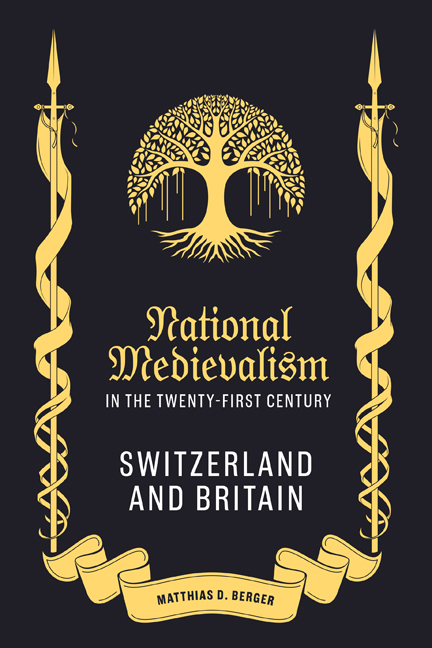Book contents
- Frontmatter
- Dedication
- Contents
- List of Illustrations
- Acknowledgements
- Author’s Note
- List of Abbreviations
- Introduction
- 1 Constructing Continuity: Four Nations Imagine Their Beginnings
- Part I The Politics of Autochthony
- 2 For Freedom Alone: The Scottish Independence Referendum
- 3 2016 and All That: Brexit
- 4 Freiheit statt Vögte: The Swiss National-Conservatives
- Part II The Others of National Medievalism
- 5 Masculine Middle Ages: Gender
- 6 In Strange Lands: Race, Ethnicity, Immigration
- Conclusion: The Demands of the Past
- Afterword: National Medievalism in the Age of COVID-19
- Bibliography
- Index
- Medievalism
Part I - The Politics of Autochthony
Published online by Cambridge University Press: 17 December 2023
- Frontmatter
- Dedication
- Contents
- List of Illustrations
- Acknowledgements
- Author’s Note
- List of Abbreviations
- Introduction
- 1 Constructing Continuity: Four Nations Imagine Their Beginnings
- Part I The Politics of Autochthony
- 2 For Freedom Alone: The Scottish Independence Referendum
- 3 2016 and All That: Brexit
- 4 Freiheit statt Vögte: The Swiss National-Conservatives
- Part II The Others of National Medievalism
- 5 Masculine Middle Ages: Gender
- 6 In Strange Lands: Race, Ethnicity, Immigration
- Conclusion: The Demands of the Past
- Afterword: National Medievalism in the Age of COVID-19
- Bibliography
- Index
- Medievalism
Summary
What constitutional medievalisms I have discussed so far trace political institutions back to their first stirrings in the Middle Ages. They underpin the state whose institutional antiquity they proclaim. This section, by contrast, is dedicated to the ways in which medievalism – including constitutional medievalisms closely related to those just outlined – has been put to work in the context of major political developments, even upheavals, over the three decades since the 1990s. The same memory sites and traditions can be enlisted to support the status quo and agitate for radical constitutional change. The reason why the medievalism employed in contemporary politics demands its own section is not just that it is by tendency disruptive and party-driven, rather than stabilising and (ostensibly) consensus oriented. Rather, I discuss it in detail – with separate chapters for the different national contexts – because it has reached remarkable prominence in a volatile and distinctive political moment. Unlike anything seen in more than half a century, medievalism in Britain and Switzerland, as in Western Europe more generally, has not only attended but informed many of the major political developments of the day: the flowering of Eurosceptic and other nationalisms, the desire for downscaling, the occasional stunning upsets of political ‘exitism’. Nor are these political medievalisms the exclusive province of professional politicians or political organisations. In many instances, they are produced by citizens engaging in politics from without its formal settings.
My broader premise is that since the turn of the century political medievalism has benefitted from a turn to what I have called a politics of autochthony. In its purest and most problematic form, this brand of identity politics seeks to transform a series of highly contingent events, from the distant past to the present, into the ‘natural growth’ of the nation and insists on the primacy of ‘organic’ or ‘homegrown’ national identity, political institutions and law over outside influence and international exchange. Broadly geneticist in thrust, its explanatory power is thus derived from a vertical analysis that predominantly looks to tradition, sources and precedent. It does so at the expense of horizontal, contemporaneous influencing factors that transcend the borders of the (national) body it describes.
- Type
- Chapter
- Information
- National Medievalism in the Twenty-First CenturySwitzerland and Britain, pp. 77 - 79Publisher: Boydell & BrewerPrint publication year: 2023

